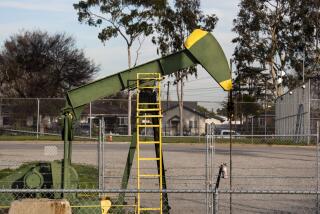U.S. Would Move to Safeguard Oil
- Share via
WASHINGTON — U.S. invasion plans for Iraq call for securing the country’s oil fields “as rapidly as possible,” a strategy shaped by new intelligence indicating that Saddam Hussein is planning to destroy them in case of war, a senior Defense Department official said Friday.
The intelligence also has prompted Bush administration officials to ask private oil firefighting companies to prepare for disaster duty in Iraq, U.S. and industry officials said.
The disclosures underscore the extent to which Pentagon planners are becoming convinced that Hussein will pursue a scorched-earth strategy.
“We see that as a real potential crisis,” said the Defense Department official, who spoke on condition of anonymity. He cited “reliable intelligence sources that those activities have been planned and in some cases that they may have been begun.”
The official declined to elaborate on the intelligence but acknowledged that the United States has seen no evidence yet that Iraq is wiring wells with explosives or taking other steps to carry out such plans.
If Hussein succeeds in torching a large number of Iraq’s 1,500 oil wells, the result could be an environmental and economic disaster twice the magnitude of the 1991 Kuwait oil fires, the official said.
The question of whether Hussein would order the destruction of his country’s oil fields has been a subject of considerable debate. Intelligence officials first raised the possibility publicly a month ago. Friday’s briefing signaled there is now consensus within the Pentagon that this is indeed Hussein’s plan.
Defense officials said they are planning to drop leaflets and use other channels to urge Iraqi troops to ignore orders to ignite the wells. The senior defense official would not discuss in detail plans for securing the fields.
Some experts cited several factors that might reduce the odds that Hussein would carry out the destruction.
Most of Iraq’s oil production takes place in two giant fields, Kirkuk in the north and Rumaila in the Shiite Muslim-dominated south. Both are far from Baghdad, the likely focal point of a military offensive, and from central Iraq, where Hussein’s political and military strength is greatest.
“I don’t think [advancing U.S. forces] would find big resistance from the Iraqi army,” said Mohammed-Ali Zainy, a former Iraqi Oil Ministry official who defected during a 1982 OPEC conference. “The damage would be minimal.”
Analysts also said Iraqi troops or civilians would be unlikely to carry out orders to torch the fields.
“It’s one thing to set the oil wells of another country afire. It’s another to set your own afire,” said Robert Ebel, energy program director at the Center for Strategic and International Studies and a former CIA oil analyst. Even so, Ebel acknowledged that military planners cannot rule out the possibility of sabotage to wells and other parts of the petroleum infrastructure.
The Pentagon official said burning oil wells would do nothing to impede a U.S. invasion. The fields are not regarded as important routes for U.S. forces, and clouds of black smoke would not deter pilots using smart bombs and on-the-ground spotters.
But the official said the environmental toll could be devastating. Iraq has more than twice the number of wells that were torched in Kuwait. Hussein could also pump 2 million to 3 million barrels of oil daily into the Persian Gulf.
The Kuwaiti fires and spills of 1991 are estimated to have killed 15,000 to 30,000 birds and contaminated 400 miles of coastline.
Iraq’s oil reserves -- capable of producing between $20 billion and $30 billion in revenue annually -- are also key to the country’s ability to recover economically, the senior Defense official said.
If the United States does move swiftly to seize the fields, it is certain to fuel perceptions that America’s confrontation with Iraq is largely about petroleum. Secretary of State Colin L. Powell has recently sought to assuage such concerns, pledging that money from Iraq’s oil would not be used to pay the costs of a war and would instead benefit the Iraqi people.
Officials at two of the biggest private firefighting companies confirmed that they have begun preliminary discussions with Bush administration officials and are prepared to send crews to the Middle East.
Patrick Campbell, president of Wild Well Control, said he is ready to field three teams of firefighters, support personnel and hardware.
“We’re ready,” he said. “We’d have them on an airplane tomorrow.”
Les Skinner, director of well control engineering at Cudd Well Control, said his company has done contingency planning with administration officials and is capable of sending three firefighting teams to Iraq.
The three leading companies -- Wild Well Control, Cudd Well Control and Boots & Coots International Well Control -- all have their headquarters in Houston.
Industry officials said Iraqi oil fires might be more difficult to control than those in Kuwait. Many of Iraq’s wells produce at much higher volumes -- as much as 100,000 barrels a day, compared with 10,000 to 50,000 in Kuwait.
In 1991, U.S. government and oil industry officials originally said it could take as long as five years to extinguish the blazes in Kuwait. But the job was completed in a fraction of that time, thanks in part to techniques introduced by crews from Russia and Eastern Europe.
“They put jet engines on sleds,” said senior fellow Philip K. Verleger Jr. at the Council on Foreign Relations. “They’d back a sled up to the fire and turn the jet engine on. The air pressure would blow out the fire, and the people would go in and cap it.”
More to Read
Sign up for Essential California
The most important California stories and recommendations in your inbox every morning.
You may occasionally receive promotional content from the Los Angeles Times.










